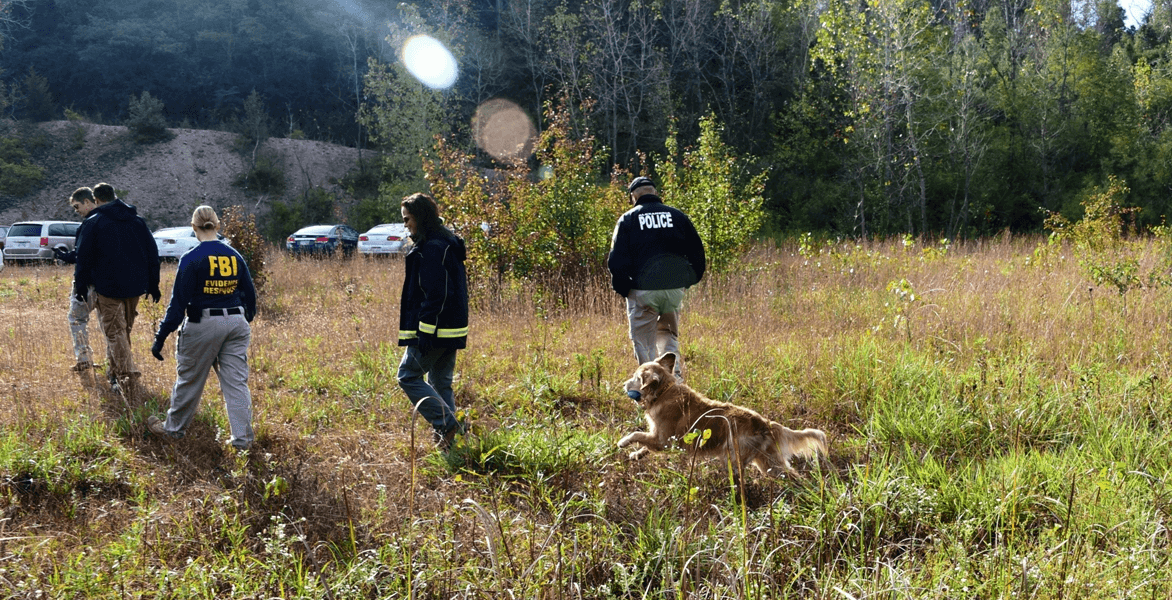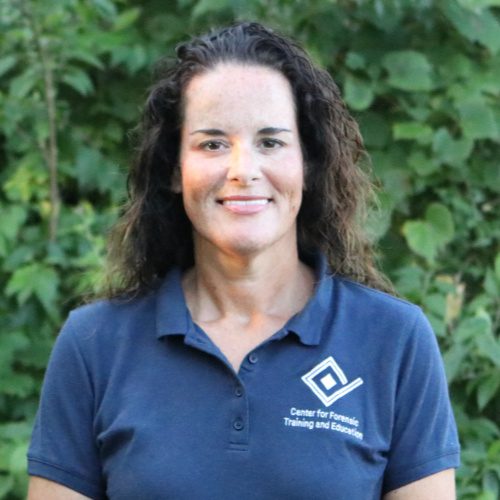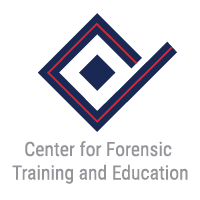Let’s Talk: Networking With Agencies To Increase Callout Frequency

We’ve spent the last 4 weeks focusing on training that centers around your dog. If you’ve been involved with K9 search and rescue for any length of time, you know there is so much more that goes into what we do including handler training, fundraising, educating the public, and building relationships with agencies that request our services.
Beyond Dog Training
Networking with agencies that request your services may be the most critical part of operating a search team aside from training. As a volunteer K9 handler for Ohio Task Force One and Ohio Search and Recovery Canines (OSAR K9), I spend the majority of my time with OSAR K9 educating agencies on how to effectively utilize dogs for lost and missing person searches. Every presentation I give and every interaction I have is an investment into the success of our organization.
If you can’t clearly and confidently communicate what your organization provides to law enforcement, fire departments and emergency management agencies, it will be a struggle to get call outs. And if you aren’t getting callouts then what is the purpose of all of the training, time and money you are investing?
3 Phases Of Agency Relationship Building
In marketing circles there is a process frequently referred to as “Know, Like, Trust”. As a volunteer K9 search team you aren’t selling a product, but you are “selling” your services (even though we aren’t paid). If you want to receive callouts, then agencies need to know, like, and trust your organization. Remember moving from know to like to trust is a marathon, not a sprint. It can take years to cultivate these relationships and once that trust is gained, it is your responsibility to make sure that it remains strong.
Phase 1: Make Sure Agencies KNOW You
So how do you move from know, to like, to trust? If an agency doesn’t KNOW you then your chances of getting a callout from them is very low. Take the time now to identify all of the law enforcement, fire department, and emergency management agencies in your area. Prioritize the agencies that are geographically closest to where your team members live.
If you haven’t already, introduce yourself to those agencies.
Even if you have worked with those agencies in the past, reach out and make sure they still have your information and confirm your point of contact within the department. Turnover is high and the person you dealt with on a search two years ago may have changed jobs or retired.
Phase 2: Get Agencies To LIKE You
Once the agencies in your response areas know you, it’s time to work on getting them to LIKE you. This has nothing to do with how they feel about you personally. At this stage, you are providing the agency more information about your organization’s capabilities and how you can be an asset to them. This is where you get them to LIKE what you can provide them with.
A great way to do this is by asking for time to speak to the agency. It may be one-on-one. It may be an offer to provide a presentation for continuing education hours to the department. Or it may even be speaking at a county Chiefs of Police meeting. Use their time wisely! I have an hour-long presentation and from that I can condense down to 30, 15 or 5 minutes depending on the amount of time the agency allots me.
Phase 3: Earn The Agency’s TRUST
Once you have conquered know and like, you are now entering the most important phase, TRUST! Trust is the whole package. Providing the agency accurate and timely information, being accessible when they have questions, having realistic discussions about what dogs can and cannot do, presenting professional and knowledgeable handlers and support staff, and producing results on searches. Keep in mind trust takes the most work and effort to cultivate and maintain but it can be lost in a second. Treat these relationships with respect and do not take them for granted.
In order to reach the level of TRUST you need to establish your organizations credibility. Some ways to do this:
- TEAMWORK - Make sure the agency knows your first priority is locating the missing individual as one resource in their toolbox. We are much more effective when all resources work together.
- CREDIBILITY – Be willing to provide copies of all certifications and training logs for all team members. Invite members of their agency to observe or participate in your team training.
- IDENTIFY – Teach agencies how to identify reliable K9 resources in their area. Your organization, depending on availability and location of team members, may not be able to respond to every search request. Help them identify alternate reliable K9 resources as well as other reliable resource you have worked with such as ground support teams, mounted units, forensic anthropologists, etc.
- EDUCATE – A well trained K9 team is an incredible asset. However, K9s are not always the best or appropriate resource for every missing person search. It’s our job to paint a realistic picture of our capabilities and limitations.
Ready For Your FREE Training?
Now that you know our process, it's time for you to start building relationships with your local agencies. In this FREE training we are going to give you the 7 key elements for a successful agency presentation and our proven PowerPoint template to help get you started.
 Deana Hudgins, CFTE Founder, has been working in Search and Rescue since 2002. She is the Executive Director and a Founding Member of Ohio Search and Recovery Canines. She is also a Canine Search Specialist for FEMA Ohio Task Force 1 working both human remains detection and live find canines. She has traveled the country as an instructor, evaluator, and facilitator for search and rescue classes and workshops. Deana specializes in human remains detection; water, land and disaster, as well as wilderness and disaster live find. She has responded to hundreds of missing person searches for local, state and federal agencies. She frequently consults as a subject matter expert for large scale training exercises and cases, providing guidance in search strategy and planning, resource management, mapping and data collection. During her years as an instructor, Deana repeatedly saw that there was a lack of resources and training opportunities to fully prepare agencies to respond to search and recovery missions. She established the Center for Forensic Training and Education to ensure that any organization involved with the search and recovery of missing persons has access to real world, hands on, custom training opportunities.
Deana Hudgins, CFTE Founder, has been working in Search and Rescue since 2002. She is the Executive Director and a Founding Member of Ohio Search and Recovery Canines. She is also a Canine Search Specialist for FEMA Ohio Task Force 1 working both human remains detection and live find canines. She has traveled the country as an instructor, evaluator, and facilitator for search and rescue classes and workshops. Deana specializes in human remains detection; water, land and disaster, as well as wilderness and disaster live find. She has responded to hundreds of missing person searches for local, state and federal agencies. She frequently consults as a subject matter expert for large scale training exercises and cases, providing guidance in search strategy and planning, resource management, mapping and data collection. During her years as an instructor, Deana repeatedly saw that there was a lack of resources and training opportunities to fully prepare agencies to respond to search and recovery missions. She established the Center for Forensic Training and Education to ensure that any organization involved with the search and recovery of missing persons has access to real world, hands on, custom training opportunities.

